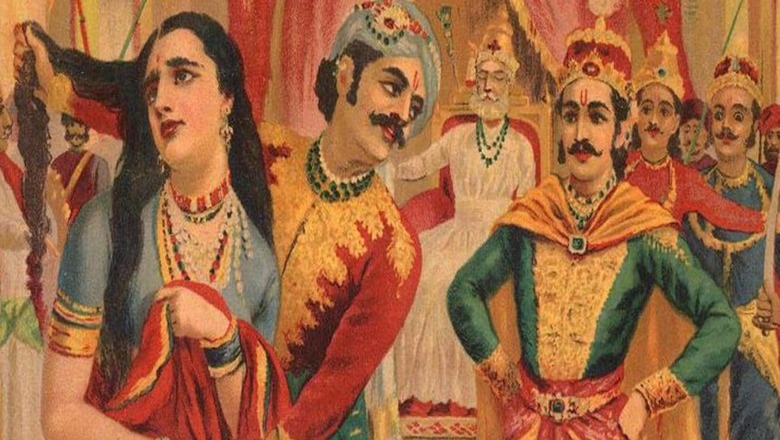
views
I must begin with the episode in the Mahabharata which triggered the line of thinking proposed in this post. This is the episode in which Draupadi is dragged into the Kuru court after she had been staked and lost by Yudhishthira, in the dice match between the Pandavas and the Kauravas. It culminated in an attempt to disrobe her in an open assembly. By any moral standards, such an act called for immediate intervention by anybody with a social conscience. And yet, nobody in the court did anything to stop it. According to the received account, she was saved by a miracle.
What has bothered me about this account is that we had a situation in which everybody knew that what was going on was wrong, and yet nobody did anything to stop it. I have used the phrase ‘moral freezing’ to describe this phenomenon.
The situation is really startling when one chooses to reflect on it. All the people present in the court had a distinguished background. There was Bhisma, the grandsire; there was Drona, who instructed the young princes in the arts of war when they were growing up; there were the five Pandava brothers; and there were the 100 Kaurava brothers. It is true that one of them, Vikarna, objected to the developments taking place, but he was shouted down by Karna. Even the king, Dhritarashtra, was present, but one has to add that he was blind and when he was made aware of the proceedings, he cancelled them. And, to atone for it, asked Draupadi for any boon she wanted.
This example might be considered archaic, or at least traditional, but let us take a look at our own times. By one account, in the 1990s, seven lakh Hindus, often described as Kashmiri Pandits, were driven out of the Kashmir valley. There was a Central government in existence, there was a state government in existence, there was a district administration in place, there was the police force, there was the Army, there was the judiciary––and nothing was done to prevent their exodus from happening. How is this different from all the people in the Kuru assembly not doing anything when confronted with moral outrage?
Let us now talk about the events which unfolded in Ayodhya on December 6, 1992, when reportedly two lakh Karsevaks razed the Babri mosque to the ground. There was, again, a Central government in existence, as well as a state government, a local administration, a police force, the Army, and the judiciary––and nothing was done. The entire structure was razed to the ground, where now a Ram Temple is being built.
A number of farmers have committed suicide in India. Again, all of us would agree that this is a tragic act which must be prevented at all costs, especially when carried out for manifest financial reasons. And yet, as in the previous cases, all the various institutions of government were in existence, including those of social welfare––and nothing has been done to prevent it. There are reports that the rate of unemployment in India is high, and may even be rising. One hears reports of individuals committing suicide because they did not have a job; couples committing suicide because they were both without jobs; and whole families committing suicide because they were without jobs––and yet nothing happens.
The cases discussed in the previous paragraph are admittedly ‘less visible’ than the egregious ones mentioned earlier, but broadly belong to the same category, as all of them exemplify the same problem.
What explains this moral freezing?
One reason could be that people feel compelled by the formal legal and administrative structures from intervening, despite the morally outrageous character of what is going on.
There is a civic example to help us think through the issue. If we are in a mall, and a crime takes place in our presence, such as someone’s purse being snatched by some miscreant, then probably an individual will intervene. It is obvious that it is the morally outrageous nature of the happening which would prompt the intervention. In fact, one can legally carry out a citizen’s arrest, and hold the person until the police arrive.
Do we need a provision of this kind in law––that a person has the right to intervene when a morally outrageous act is being committed? If such a provision existed under Hindu law, then anyone at the Kuru court could have intervened to prevent the harassment of Draupadi, instead of no one doing so. A parallel suggestion, in the case of the expulsion of the Kashmiri Pandits, is harder to make, because of the scale of the operation involved. But even here, if citizens came together spontaneously to acknowledge the morally outrageous nature of the situation, then perhaps the most outrageous events could have been prevented from taking place.
However, one comes to the sobering realisation that demography becomes involved when such an event is taking place. Individuals could have intervened in the case of Draupadi, but it would have required a large body of people to intervene in the case of the Kashmiri Pandits and the demolition of the Babri Mosque.
Practical problems notwithstanding, my purpose in writing this post is to propose that we need to create a space for moral action in our ethical discourse, when we are witness to a morally outrageous act. That is to say, faced with such a situation, an individual, or a group of individuals, should have the right to intervene. It may be that one is helpless in some situations, but the important thing to remember is that no victim should feel helpless, even if the situation is helpless. That is to say, the victim must know that people care.
One should feel compelled to act as a pure moral agent, independently of all that may be preventing one from acting in that situation. In doing so, the victims will realise that there are people with a conscience, and perhaps others may also realise that they, too, are people with a conscience.
The author, formerly of the IAS, is the Birks Professor of Comparative Religion at McGill University in Montreal Canada, where he has taught for over thirty years. He has also taught in Australia and the United States and at Nalanda University in India. He has published extensively in the fields of Indian religions and world religions.




















Comments
0 comment